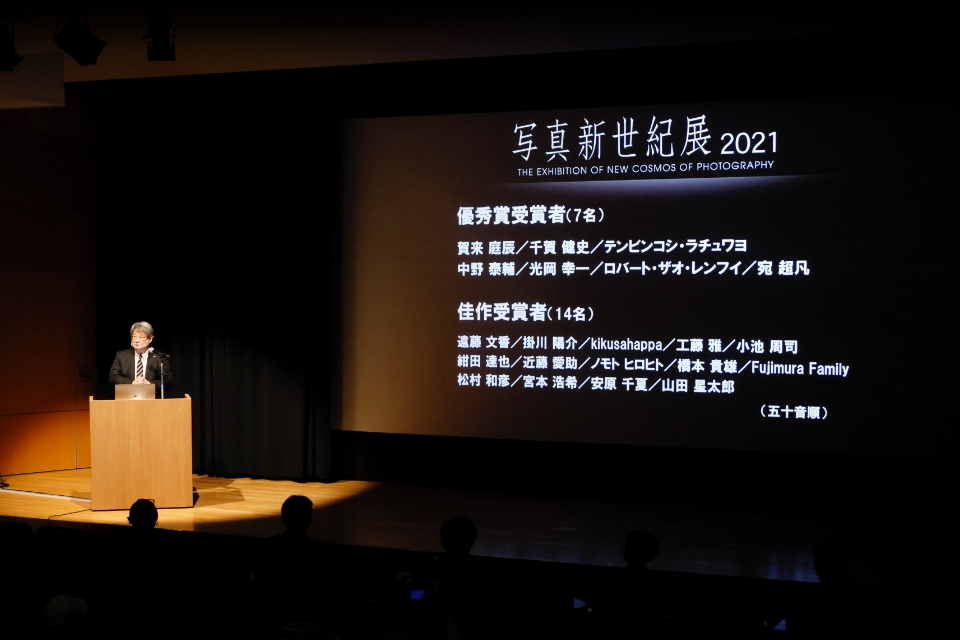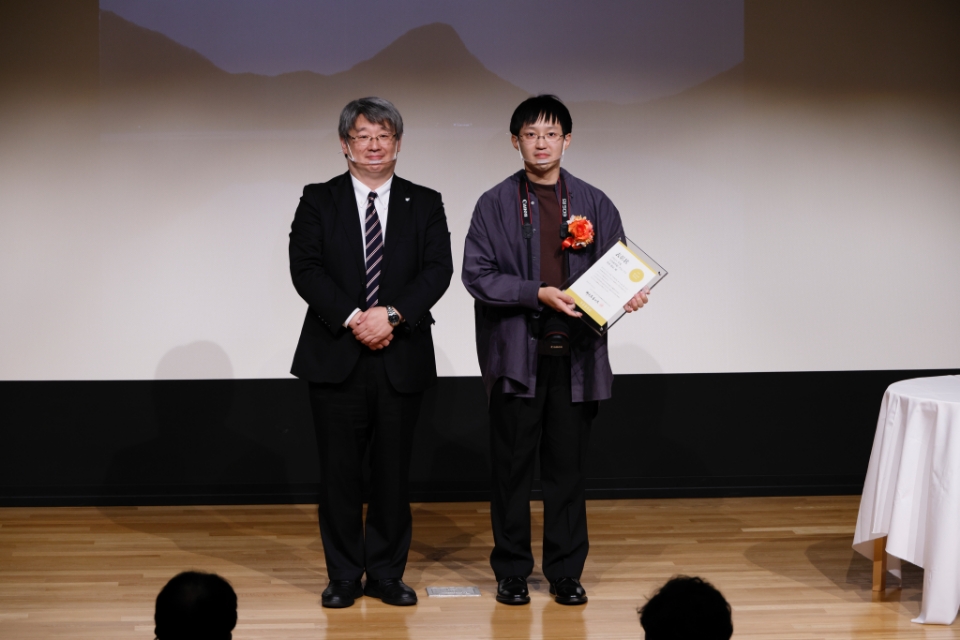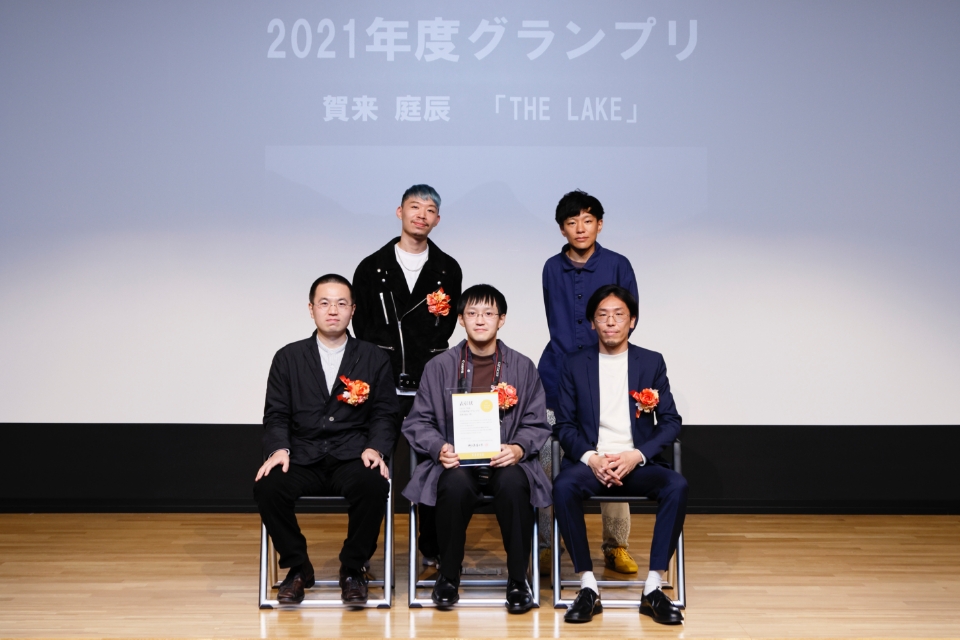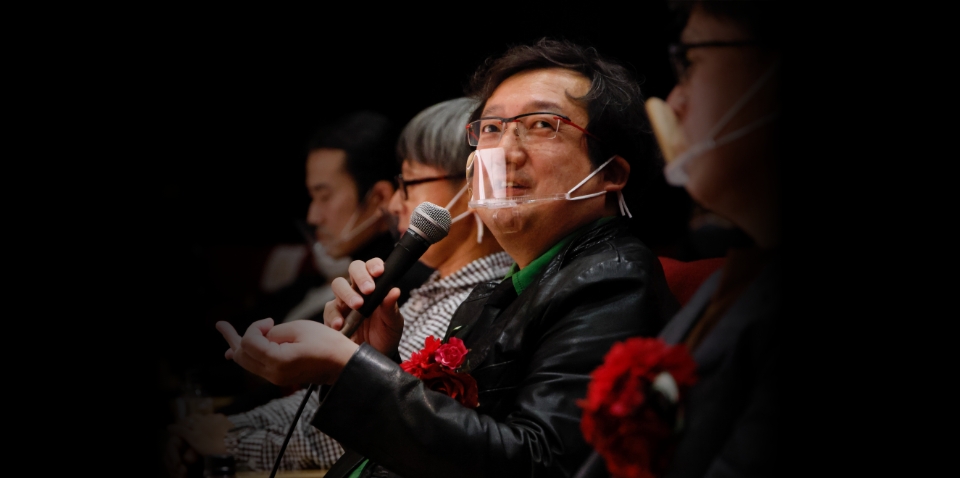The public Grand Prize selection meeting for the 2021 (44th) New Cosmos of Photography took place on Friday November 12, 2021 at the Tokyo Photographic Art Museum. This year marked the final New Cosmos of Photography contest.
For this year's contest, we welcomed seven esteemed judges: Ryan McGinley (photographer), Yuki Onodera (photographer), Minoru Shimizu (photo critic), Gwen Lee (artistic director of the Singapore International Photography Festival), Noi Sawaragi (art critic), Takashi Yasumura (photographer), and Daisuke Yokota (photographer). The judges selected seven Excellence Award winners and 14 Honorable Mention Award winners from 2,191 entrants, the most ever.
At the public Grand Prize selection meeting, the seven Excellence Award winners — Wan Chaofan, Thembinkosi Hlatshwayo, Koichi Mitsuoka, Naotatsu Kaku, Robert Zhao Renhui, Kenji Chiga, and Taisuke Nakano — gave presentations (Thembinkosi Hlatshwayo and Robert Zhao Renhui gave their presentations by video) and took questions from the judges. After the presentations, the judges conferred and ultimately selected Naotatsu Kaku as this year's Grand Prize winner.
The selection meeting kicked off on Friday, November 12 at 2:30 p.m., amid an extraordinary stillness filled with elevated expectation and nervousness. With tense expressions, five Excellence Award winners and Grand Prize candidates made their way to the podium and took their seats, after which five judges (Ryan McGinley and Gwen Lee could not attend) took theirs.

The Excellence Award winners were given seven minutes each to make a presentation, in which they described in their own words the background and creative intent of their works, along with their thoughts and feelings about their works. After each presentation, the judges offered both praise and sharp criticisms of the works and posed questions to the candidates, who gave well-considered answers.
* In order to view videos, it is necessary to consent to the use of cookies by our website. If the videos are not displayed, please click the "Cookie Settings" and accept cookies.
You can see the state of the meeting with movie.
After the presentations, the judges retired to a separate room for about an hour to deliberate and select the Grand Prize winner.
At the awards ceremony, Naotatsu Kaku was announced as the 2021 Grand Prize winner. He received one million yen in prize money and, as a bonus prize, a new Canon EOS R5 mirrorless camera.
On accepting his prize, Naotatsu Kaku said: “I'm so thrilled. I think winning this prize will help me repay, at least partially, all the generosity given to me by the wonderful people who supported me in creating this work. I received an Honorable Mention in 2017 and it's a great blessing to have been chosen for an Excellence Award this time. I was sad to hear that the New Cosmos of Photography is coming to an end. So I believe we artists must do our best so that the New Cosmos of Photography will never be forgotten.”


The New Cosmos of Photography began its run as an analog photo contest and ends with a video. I think that span is very symbolic of how far the concepts of photography and the technologies surrounding photography have travelled.
At first glance, Naotatsu Kaku's work may appear sparse and subdued. But closer inspection reveals a well-crafted fiction, like that of a first-person novelist coming to a lake to heal his wounds. It was out a sense of Mr. Kaku's future potential that we selected his work for the Grand Prize.
What intrigued us judges, through this year's Excellence Award works, was the idea, perhaps because of the times, that nature seems more threatening than ever in terms of its relationship with humans. How fragile is the civilization in which we live, how shallow is the surface on which we stand, when perhaps just a single wall or a single floor separates us from an imminent flood? Nearly all the Excellence Award works used water as a symbol of the sense of crisis about our situation, in which technology – which has clearly divided humans from nature – is not the savior we had hoped it would be. Starting with Mr. Kaku's lake, the works presented the Arakawa River, a swamp, the culverts of Shibuya, a water bucket in the middle of a forest, and traces of water left on tavern walls and floors. Water, and the sense of impending crisis about water, is a major common denominator. I feel this is where our modern age is at today.
Another similarity this time was contemplating the fundamental postulations about the human condition. I think it fitting that the contest closes on a shared theme of tackling, through photography, simple but profound questions about time, space, the world, and the self.
